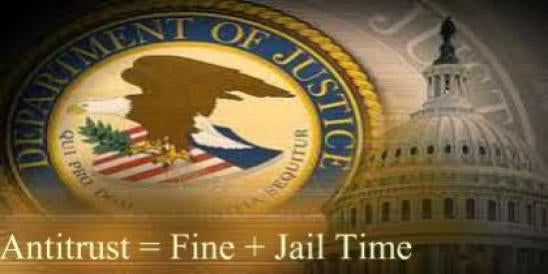United States v. Furukawa Electric Co., Ltd.
An international corporation and three of its executives recently pled guilty in response to the first charges to emerge from the Department of Justice Antitrust Division’s ongoing investigation into bid rigging, price fixing, and other anticompetitive conduct in the automotive parts industry. Furukawa Electric Co. Ltd. and three of its executives agreed to four separate four-count felony charges alleging a conspiracy to rig bids for and to fix, stabilize, and maintain the prices of automotive wire harnesses and related products sold in the United States and other countries. The felony counts alleged that officers and executives of the company met and agreed to allocate the supply of, to rig bids quoted to automobile manufacturers for, and to coordinate price adjustments requested for automotive wire harnesses and other products. Their actions affected both interstate and foreign trade and commerce. As a result of the plea agreement with the federal government, Furukawa will pay $200 million in criminal fines and the three executives will serve various jail sentences, from a year and a day to 18 months in jail.
Antitrust Laws in the United States
Many industries rely on competitive bidding to purchase the best goods and services at the lowest prices. Collusion among competitors to set prices or limit the supply of goods results in inflated prices to the American public. Therefore, the Sherman Act prohibits competitors from making any agreement to fix prices, rig bids, or engage in any other anticompetitive activity.
The types of evidence that can be used to show collusion are broad and make convictions under the Sherman Act easier. While the best evidence of collusion may be a formal written agreement to fix prices, circumstantial evidence is more typical and, when combined, will show a pattern of behavior aimed at fixing prices or rigging bids.
For price fixing, evidence may show competitors establishing or eliminating price discounts, holding prices steady, adopting a formula for computing prices, or maintaining price differentials for certain products. For bid rigging, a competitor may refrain from bidding or submit a bid too high to be accepted, or competitors take turns being the lowest bidder. If the Department of Justice uncovers evidence of any of these behaviors, the price fixing or bid rigging scheme is a per se violation of the Sherman Act. In other words, no amount of persuasion that the scheme resulted in reasonable prices or was necessary in some way will prevent prosecution or lessen sentencing.
If convicted under the Sherman Act, companies risk paying fines up to $100 million, and individuals risk paying fines up to $1 million and/or facing up to 10 years in prison. These fines may be increased up to twice the amount of gain or loss involved in the anticompetitive behavior. Many of the antitrust crimes also constitute other federal felonies, such as mail or wire fraud or false statements. In addition, companies and individuals risk civil cases from victims and may have to pay up to three times the amount of damages suffered for inflated prices or overcharges.
What Should You Do?
In light of the Department of Justice’s ongoing investigation, companies should review any agreements they have made or consider making with competitors. “Friendly” agreements or even independent behavior among multiple competitors not directly aimed at fixing prices may be perceived by the Department of Justice as a violation of the Sherman Act. As always, consult with competent legal counsel early in the process and certainly in the event that your company or your executives suspect they are under investigation for potentially anticompetitive actions.



 i
i

